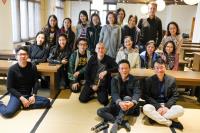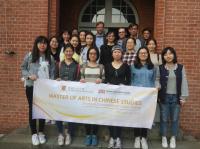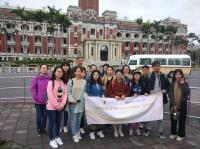|
||
|
||
|
| |||
| 14. 02. 2018 | ISSUE 1 | ||
|
| |||
| FIELD TRIP REPORT | ||||
|
From December 11 to 16, two groups of MA students went to Taiwan on separate field trips, with one group focusing on Taiwanese cinema, and another on Taiwanese society and politics. |
|
|||
MA in Chinese Studies Field trip: Chinese Arts and Culture Stream After spending much of the first term reading, hearing, and watching "Taiwan", I decided to take part in this field trip to Taipei as a result of my belief that the best way to learn about a culture is to live and experience it. The trip was the perfect complement to the theoretical understanding we had developed during our courses this term and greatly enhanced my interest in the film industry. A major part of our trip was dedicated to visiting film studios. At the Central Motion Pictures Company, we visited the abandoned movie set for The Assassin (2015). We were astonished that those once magnificent buildings in the movie have been left in a state of disrepair: red paint from the pillars peeling off, eaves on the verge of collapse, a wooden pedestal in decay. Staring at the building while rain fell all around, the person in charge explained that "this set required a lot of effort, but the box office results were not ideal," his words added a trace of sadness to our thoughts about the film itself, but also for Taiwan's movie industry as a whole. The entrance to Mr. Tu Duu-Chih's 3H Sound studio was another source of strong impressions: a gleaming wall of gorgeous film posters that highlighted a lifetime of achievements in sound production for Mr. Tu and his colleagues. However we were equally impressed by how gracious and kind Mr. Tu himself is, answering our stream of questions with enthusiasm and patience. The visit lasted about three hours and Mr. Tu was very active throughout, eager to introduce us to his equipment and the world of sound design. Among the most noteworthy items was a set of books with recorded sounds collected over several decades and of astonishing specificity, for example the sound of "wind blowing through pine forests in the Greater Khingan Mountains in November." We were left with great respect for a person like Mr. Tu, one who has reached such lofty heights in his field but still maintains such dedication and sincerity. We took part in several other great talks and discussions with notable industry people such as Wood Lin (the Taiwan International Documentary Film Festival Programmer), Mr. Shih Chun (veteran actor awarded with the Golden Horse Award for Lifetime Achievement), Mr. Wen Tien-Hsiang (CEO of the Golden Horse Film Festival). Personally, I found particularly inspiring the talk by famous director Tsai Ming-liang, accompanied by his long-time collaborator actor Lee Kang-sheng and the film scholar Prof. Sing Song-Yong. What moved me the most in that lecture was Mr. Tsai's honesty and his passionate, uncompromising pursuit of a personal brand of filmmaking. These are qualities that I believe all filmmakers should strive towards. In the end, the field trip was not only a series of academic activities; it also provided a great social setting for getting to know better my classmates and teachers. Although busy, our schedule allowed for plenty of opportunities to hang out together and we all made many friends in these six days. Some of us had not travelled together with a group of classmates since high school; this experience both took me back to those days and also managed to create new, unforgettable memories. MA in Chinese Studies Field trip: Issues in Contemporary China Stream From 11 to 16 December, Dr. Tim Summers and Dr. Leung Kai Chi took MA in Chinese Studies students from the Issues in Contemporary China stream on a six-day field trip to Taiwan. In addition to tours and visits to museums and historical sites in Taipei and Tainan, the field trip schedule included a diverse set of lectures and discussions on Taiwanese politics, economy and society with academics at three local universities as well as with members of the Democratic Progressive Party Central Committee. These activities allowed students to engage with a variety of viewpoints and weigh different opinions in the pursuit of answers for their personal research projects. Some of the key themes investigated in multiple lectures and visits throughout the field trip were related to the multiple socio-political identities in Taiwan and to issues of transitional justice. As such, among the activities that made a powerful impression on the students and highlighted critical aspects of Taiwan's modern history were the visits to the 228 Memorial Museum and the Jingmei Human Rights Cultural Park. Hu Anling appreciated the thorough discussion with the museum guide on various aspects of the February 28 Incident, while Qian Yingyin expressed how these visits had a major impact on her overall understanding of Taiwan's history and this personal experience offered a tangible compliment to her earlier readings on the topic. "How to face the embarrassing past, to conceal or reveal it, for example, is a significant issue that is constantly brought up and talked about in Taiwan," said Liu Xia. "It is healthy and necessary, because although 'transitional justice' is hard to achieve and it is impossible to satisfy everyone; however this can at least help maintain a shared historical memory, make up to the victims, and raise public awareness–both among the ordinary people and, hopefully, the authorities. For many students, this was their first time in Taiwan. Wang Botao described how popular culture had created strong images and expectations about Taipei, but he was still surprised by how unlike other Chinese metropolises it was, appearing to lack the frantic pace of Shanghai and Hong Kong and offering more opportunities to simply enjoy life. Hu Anling appreciated the structure of the field trip, which she found deliberately organised to quickly build up student familiarity with Taiwanese society and politics within a short period of time. Others, like Liu Xia, had visited Taiwan multiple times before, but this particular instance was easily the most rewarding: "Unlike an ordinary tourist, this time I could explore [Taiwan] in depth and from different angles, such as from the perspective of government, national history, local culture, and people's everyday life— and with the adept guidance of our instructors as well as local experts." |
||||
|
|
Past Issue
| |
|
|
|
|
|









